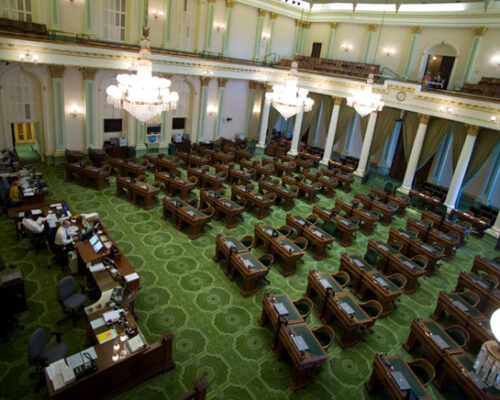
In the last few weeks of June, the Assembly and the Senate decided the fate of all bills that originated in their house. All of the following bills that are supported by Habitat for Humanity California passed out of their House of Origin and will be moving forward to the next House in July. Each of these important measures address various housing policy issues from tenant protections, to CEQA streamlining, to expanding the State Density Bonus law and, taken together, have the potential to increase housing production while preserving and protecting existing affordable housing. Your Lighthouse team has worked on closely with the authors on these measures to ensure that they reflect Habitat for Humanity California’s priorities. We have been in numerous discussions to guarantee that homeownership has a more prominent role in both the housing and economic justice conversations taking place in the Legislature, and believe we are making significant progress with many prominent elected officials and state agencies.
- SB 902 (Wiener): SB 902 would retain local control by allowing local governments to increase the baseline zoning for residential properties. It would allow cities to bypass CEQA review when they rezone for small developments of up to 10 units.
- SB 899 (Wiener): Streamlines the building process for religious institutions and non-profit hospitals and higher education institutions that want to build affordable housing by allowing them to build 100% multifamily affordable housing units (targeted at 80% of Area Median Income and below), regardless of local zoning restrictions.
- AB 1851 (Wicks): Requires a local agency to ministerially approve a request to reduce or eliminate any parking requirements on the development if the housing development project qualifies as a religious institution affiliated housing development project.
- AB 3040 (Chiu): Increases the development of housing by incentivizing local governments to up-zone land that is currently zoned only for single-family homes to also allow duplexes, triplexes, and fourplexes.
- AB 2553 (Ting): Emergency Homeless Shelters. Based on the successful AB 932 pilot applied to Oakland, Berkeley, and San Jose, extends single-city pilot to the State for five years flexible standards needed to get homeless shelters built quickly and safely by imposing safety standards reviewed by HCD rather than the strict application of State Building Code to streamline.
- SB 1385 (Caballero): Would authorize a housing development project use of a neighborhood lot that is zoned for office or retail commercial use under a local agency’s zoning code or general plan. The bill would require the density for a housing development under these provisions to meet or exceed the density deemed appropriate to accommodate housing for lower income households according to the type of local jurisdiction, including a density of at least 20 units per acre for a suburban jurisdiction. The bill would also provide that the local zoning designation applies if the existing zoning designation for the parcel allows residential use at a density greater than that required by these provisions.
- AB 2323 (Friedman): This bill ensures that (CEQA) streamlining for housing projects works as intended, and that well-planned housing near transit and jobs is not delayed unnecessarily.
- AB 2345 (Gonzalez): This bill would increase financial incentives within density bonus law.
- SB 1085 (Skinner): This bill would require a city or county to grant a density bonus if the developer agrees to construct a housing development that will contain that specified percentage of units for persons and families of moderate income.
- SB 995 (Atkins): This bill would expand the application of streamlining the CEQA process to smaller housing projects that include at least 15 percent affordable housing. It also would broaden application and utilization of the Master Environmental Impact Report (MEIR) process, which allows cities to do upfront planning that streamlines housing approvals on an individual project level. The bill would extend and expand a program that has generated 10,573 housing units and created nearly 47,000 jobs since 2011.
- SB 1120 (Atkins): Builds off state Accessory Dwelling Unit (ADU) law that allows for at least three units/parcel; further encourages small-scale neighborhood development spearheaded by homeowners by creating a ministerial approval process for duplexes and lot splits that meet local zoning, environmental and tenant displacement standards.
